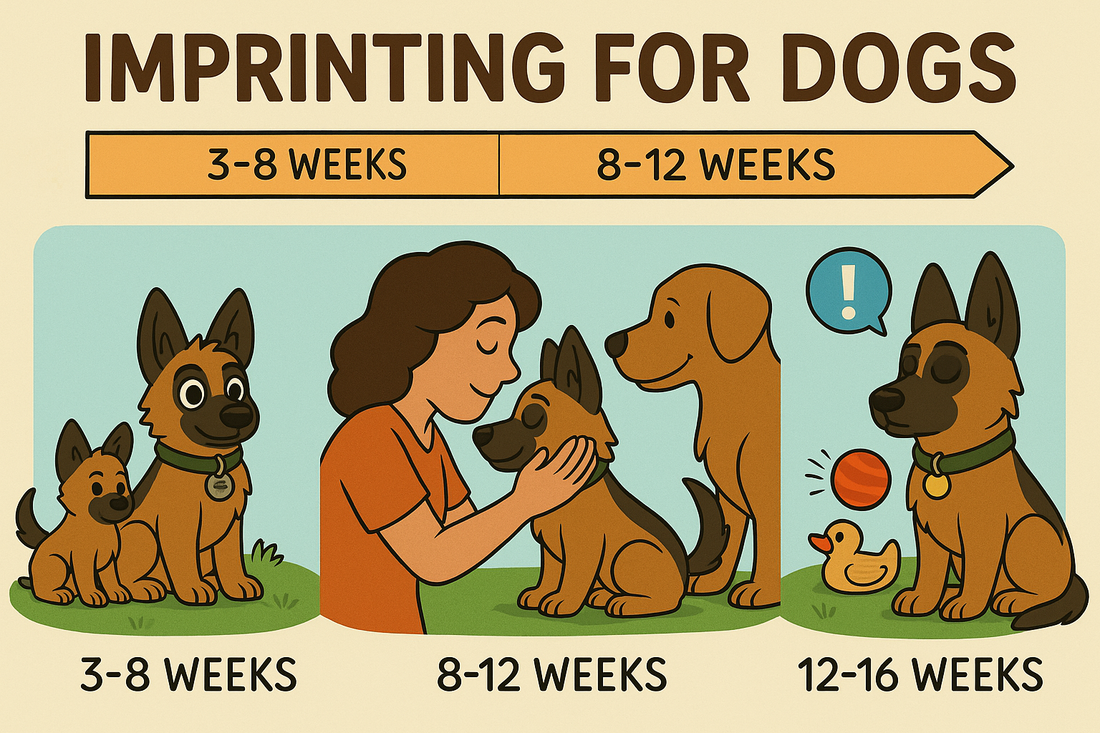
Imprinting for Dogs: Why It's Important and the Window Period
Partager
Imprinting is a powerful, natural process that plays a critical role in a dog’s development. Understanding this process and the “window period” of imprinting can make a significant difference in how a dog behaves, responds to training, and interacts with people, other animals, and the world around them. Whether you’re raising a puppy or working with a dog at any age, understanding imprinting is essential for fostering a strong, positive bond and behaviour.
What is Imprinting in Dogs?
Imprinting refers to a phase during early development when puppies are particularly sensitive to their environment and experiences. During this time, they "imprint" certain behaviours, reactions, and associations, which can significantly impact their adult behaviour and responses. It's a vital part of their learning process, especially in terms of socialization, attachment to their human caregivers, and how they view the world around them.
While imprinting in dogs is not as strict or defined as it is in some species (like birds), it still plays a crucial role in shaping their development.
The Importance of Imprinting
Imprinting is foundational to a dog’s emotional and behavioural development. Here's why it's so important:
- Socialization: During the imprinting period, puppies begin to learn how to interact with other dogs, animals, and people. Proper socialization during this period helps prevent fearful, anxious, or aggressive behaviour in adulthood. A well-socialized puppy is more likely to be comfortable around different environments, people, and situations.
- Bonding with Humans: The first few weeks of life are critical for forming strong, positive bonds with humans. This imprinting period helps a puppy learn that humans are trustworthy, and it lays the foundation for healthy human-animal relationships. Dogs that are well-imprinted with humans are generally more cooperative, responsive, and affectionate.
- Behavioural Foundation: Puppies learn essential behaviours and reactions during imprinting. They begin to understand cues, social signals, and behaviours that are necessary for adapting to their environment. Training during this period can shape how a dog reacts to commands, how they are house-trained, and even how they engage in play.
- Preventing Fear or Aggression: Puppies that miss out on critical socialization experiences during the imprinting period are more likely to develop fear-based or aggressive behaviours later in life. Early exposure to positive experiences with people, animals, and new situations can prevent these challenges.
The Window Period of Imprinting
The imprinting window is the specific period during which puppies are most sensitive to their experiences. This "window" usually occurs between 3 to 16 weeks of age, with the most crucial phase being between 3 and 12 weeks. During this time, puppies are particularly receptive to learning and absorbing new information about their environment.
- 3 to 8 Weeks: This is the period when puppies are most open to learning about their world. They’re exploring and forming initial social bonds with littermates and humans. Positive experiences with handling, new people, and other animals during this stage are essential for helping them develop into well-adjusted dogs.
- 8 to 12 Weeks: This is the peak of socialization. Puppies that are exposed to different people, places, sounds, and situations during this period will generally develop into dogs that are confident, adaptable, and less likely to show fear or aggression later in life. This is also the period when puppies are typically placed in their new homes, so early socialization with their new family is critical.
- 12 to 16 Weeks: While the window period is still open, puppies in this stage may become more cautious or reserved. They may need more time to adjust to new situations and experiences. Socialization is still important, but it becomes more about reinforcing positive experiences rather than introducing new ones.
How to Take Advantage of the Imprinting Period
If you're raising a puppy, here are a few ways you can make the most of the imprinting period:
- Expose Them to New Experiences: Introduce your puppy to a variety of environments, people, and other animals. This helps them develop confidence and social skills. Positive experiences will shape how they respond to new situations in the future.
- Positive Reinforcement: Reward good behaviour with praise, treats, and affection. This reinforces positive associations with new experiences, people, and places.
- Handle Them Frequently: Gently handle your puppy, touching their ears, paws, mouth, and body. This helps them get used to being touched and handled, which will be essential for grooming, vet visits, and general handling.
- Set Up a Routine: Puppies thrive on routine. Establish consistent feeding, potty, play, and rest times to give them a sense of security.
- Avoid Negative Experiences: It’s important to avoid overwhelming or frightening your puppy during this period. Negative experiences can lead to fear or anxiety later on, so always aim for positive, calm interactions.
What Happens After the Window Period?
While the imprinting period is the most crucial time for shaping a dog’s behaviour, it's not the end of their ability to learn. Dogs continue to learn throughout their lives, but the experiences and lessons they absorb during their imprinting period have a lasting impact. After the window period, socialization and training should still continue, though it may take a bit more time and patience to help older puppies and adult dogs adjust to new situations.
Imprinting is a powerful and essential process in a dog’s development. By understanding the window period and making the most of these critical early weeks, you can set your puppy up for a lifetime of positive behaviours, strong bonds, and well-adjusted interactions. Whether you’re raising a puppy or working with an older dog, it’s never too late to create positive experiences and reinforce healthy habits.
If you're unsure about your dog’s socialization or need guidance on imprinting during the critical window period, reach out to a professional trainer or behaviourist to ensure you're giving your dog the best start in life.